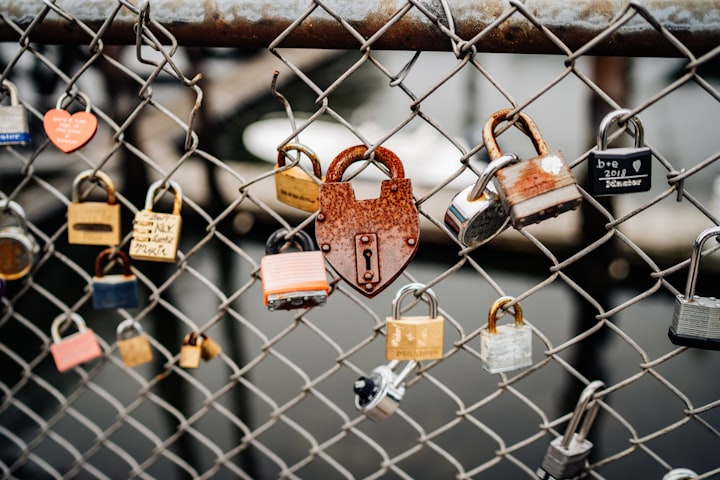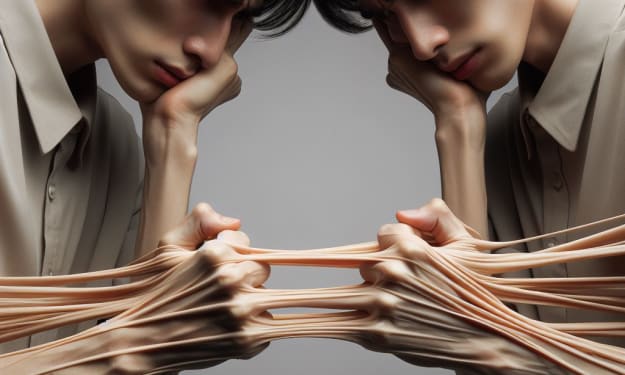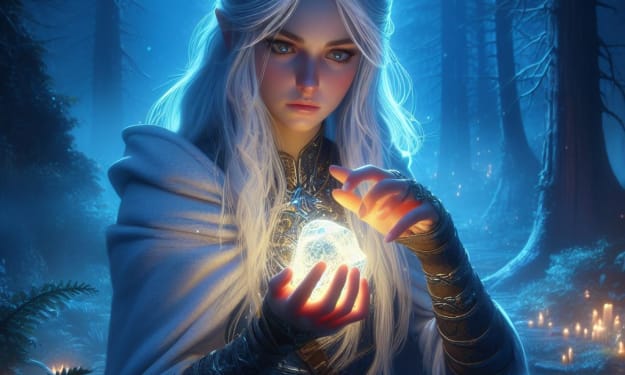
I don’t know why I reclaimed the locket.
It wasn’t exactly a family heirloom— I’d traded a handful of arcade tickets for it when I was in the 4th or 5th grade, and swapped a scratchy hemp cord for the cheap chain after it turned my neck green. Frankly, I’d forgotten it existed until the dented metal heart resurfaced as I rummaged through the boxes stashed in the hollowed-out wall of my stepfather’s basement. Nevertheless, I impulsively stuffed it into my backpack.
Karl met me at the top of the basement stairs, shifting nervously on bare feet. He’d been balding even before our heads were shaved, and the cream-colored scrubs emphasized his pallid, mottled complexion to the point that he resembled an incongruously fastidious zombie in the dim light. He was a decent guy, as strangers go.
I’d met him in person for the first time at mom’s funeral, and hadn’t expected our acquaintance to last more than a few hours. He was so laconic that I still knew little about him after sharing his house for the past four months as the world collapsed around us. He had found me at my hotel after the announcement went out that any unmarried women who could not shelter with a male relative during the transition would be relocated to a “communal sanctuary” run by The Shepherds. He’d kept the “step-“ aspect of his fatherhood to himself when questioned by the armed guards in the lobby.
I could have done more to reach out and connect with him, even under the circumstances, but his awkward mannerisms and unblinking eye contact creeped me out. I guess having a secret, hollowed-out wall in his basement was also a pretty creepy quality, but it had clearly been stuffed in haste with fiction novels, mundane mementos, and survival gear—y’know, contraband—so it felt unfair to hold it against him. Besides, when I confided that I needed to try to get out of the commune before things got worse, he’d nodded and led me to the cache, telling me to take whatever I needed and asking no questions. Besides the locket, I’d helped myself to a backpack, some rope, a pocket knife, a week’s worth of emergency rations, a water bottle, a water purifier, a first aid kit, hand wipes, sanitary supplies, and some of mom’s old clothes that I thought might fit. Many of the items still had the REI tags on them.
When I pointed this out, he sighed and shrugged. “Your mom had mentioned wanting to go out camping more, before… well.”
“Camping more?” I asked, trying and failing to envision my chain-smoking mother and her meticulous manicures in any context more adventurous than a poolside barbecue.
He shrugged again. The silence loitered for a moment, until I was nearly as desperate to be out from under his stare as I was to be outside the perimeter’s chain link fence. I extended a hand.
“Thanks, Karl. I appreciate the help, and I hope everything works out for you.”
“You, too. Stay safe,” he returned, shaking my dry hand in his clammy one.
He looked as though he wanted to offer more detailed advice, but wouldn’t have been qualified to do so even under normal circumstances, so he just nodded. I walked out the back door. Curfew had begun several hours ago at sundown, so being seen meant being caught, and I didn’t want to find out what being caught meant.
---
I didn’t open the locket until about three weeks later, as I was dying.
I had counted on being able to scavenge food from homes and convenience stores, like in the movies, but more often than not they were either devoid of anything useful or already occupied—whether by The Shepherds or some other cult, I wasn’t sure. The act of approaching strange men had been outside my comfort zone even before the apocalypse, so I wasn’t curious enough to begin now. There were worse ways to die than starvation, and certainly worse ways to live.
Sheltering under an overpass, staring up at the graffiti and dirty concrete, I thought of Chelsea. Our small apartment in a big city; the houseplants she helped to flourish; the one-eyed, three-legged pitbull she’d been reluctant to let me bring home less than twelve hours before declaring the boxy-headed doofus her own precious child; the engagement I had avoided calling my mom to announce until it was too late.
Remembering the locket, I feebly clawed open the backpack and dug through it with shaking hands until one closed around the metal, hotter somehow than the humid summer night. The copper color had rubbed off the center of the heart, leaving an empty-looking tinny patch. I prised it open with dirty nails. The locket had been much too small for a normal photograph; my mother’s face took up the entire heart, and most of her left eye was lost to the dip at the top. I remembered taking the photo on Christmas Day, with a secondhand polaroid camera that had made me cry with joy upon unwrapping it. The same camera she’d broken a few months later as punishment—probably for back talk, but I couldn’t really remember. On the opposite side of the locket, in lieu of my own face, I’d placed three shiny stick-on earrings: a pink heart, a green star, and an orange circle.
I stared at the grainy, inexpertly cut fragment of my mother, the image buckling slightly in the middle. I guess neither of us ever really got the entire picture when it came to each other.
Something struck the back of my head, and I dropped the locket in surprise. I craned my neck to see what might have hit me, then stood on trembling legs and turned slowly in a circle. Nothing was there. I sat back down, goosebumps covering my skin despite the heat. It had felt like—
“You need to get out of your own head, kid, damn. Let shit go, quit carrying it all the time. Sure you’ve gotta be strong, but you can also travel light, y’know?”
My mother sat on the opposite side of my backpack, examining the locket she held in two fingers of one hand, mirroring how she held the half-smoked Camel cigarette in the other. I didn’t say anything, and neither did she. After a long moment, she handed the locket back to me. It was freezing cold.
---
I didn’t remember falling asleep, but if I had, I don’t think I would have expected to wake up again. I did, though.
It took several moments for my vision to clear enough to see the three cans of chicken soup neatly stacked beside my backpack. Behind them stood two plastic bottles of water. My tongue felt like an enormous wad of tissues filling my mouth, and the pain of peeling my lips apart made me certain I’d removed the skin from one or both with the action, but the splash of warm water once I’d opened the bottle… it was indescribable. I drank about a third of it before I could stop myself, and my stomach cramped painfully.
“Just take it slow,” my mom crooned. “You’ll feel even worse if you barf it all up again.”
Crouched beside me on the concrete, she appeared younger than last night. I remembered her speaking those exact words, in that exact voice, when I’d had the flu as a little kid. Just like I recognized her speech about “travelling light” from the night I’d broken up with my first boyfriend.
“Mom… how are you here? Are you a ghost?”
She blinked, or I did, but suddenly she was leaning against my backpack as though it were the cushions of our old couch. She was older again and wearing threadbare, pink flannel pajamas.
“I dunno, I just think it’s stupid. The whole idea of ghosts behaving like either regular people or monsters. If they exist at all, they’re probably more like echoes or photographs. I don’t think they could interact with you as anything more complex. Like, why would they be different or new in death? Even hair and nails don’t grow after you die, that’s just a spooky myth. They look like they’re growing because the body… what’s it? Shrinks up ‘cause it’s drying out. If ghosts do exist, you probably get what you had in life. Or maybe you just get what you perceived in life, not even the whole thing. Desiccates, that’s the word. For the shrinking corpse thing.”
I picked up one of the cans. Progresso, with the pop-top lids. One of the few things mom always had in the cupboard, buying in bulk whenever they were on sale.
“How did you bring me soup?”
“Quit acting surprised when I take care of you, brat,” she laughed, younger again and wearing the t-shirt from my short-lived soccer days as she ruffled my hair. “You’re gonna hurt my feelings.”
---
Walking down the empty interstate with my ghost mother was so far the most surreal experience of the apocalypse, surpassing even the momentary shock when—in the stillness left by the absence of cars and other humans—I identified the persistent, low thudding noise that had followed me for miles: my own heartbeat.
When I looked directly at her, she looked exactly as she had the last time I saw her: annoyed and furiously chewing nicotine gum as she hobbled on her favorite pair of strappy, cork-heeled platform sandals. When I looked ahead at the road, she seemed much taller and more sure-footed in my periphery, lightly obscured by the swirls of cigarette smoke, the way she had before I’d gotten too old to hold her hand when crossing the street. Which one of us had decided when I was too old?
“I’m getting married, mom. Her name is Chelsea.”
She didn’t react or even acknowledge that I’d spoken.
“I kept wanting to call and tell you, but I wasn’t sure what you’d say, so I kept putting it off.”
Still nothing.
“Sometimes I feel guilty because I’m relieved we don’t really have to have that conversation, and I don’t have to find out whether you’d abandon me. Sometimes… you were kind of awful. "
“Yeah, and you’re always such a peach,” she snarked back, the fighting words as comfortable as old shoes.
I stopped and turned to face her.
“I was right to lock you out sometimes. You took care of me, and you protected me, but sometimes you hurt me just because you could, and… I didn’t want to give you the chance to hurt the other people I loved. Now it’s over, and all I have are the echoes. I know I’ll never see the parts of you I was too scared to look at. Maybe you would have surprised me, or maybe you would have destroyed me. I just…” I didn’t know how to finish.
She kissed my forehead, then met my eyes the way she had when I boarded the plane for college, her voice heavy with tears I’d never once seen her shed. “Travel light, kid.”
I tried to take her hands, but they slid through mine. I couldn’t remember what it would have felt like.
“I wish the weight of loving you wasn’t so heavy, mom. I’m still going to carry the parts of you that make me strong,” I sniffed, my throat tight. “I’m going to lock them tight to my heart, and I’m going to let the rest stay behind. I’m going to be okay with the things I can’t know. You stopped growing, but I still can.”
I breathed deep, exhaled, and closed the locket. The cord scratched my neck as I let it fall, but the flimsy tin wasn’t too heavy anymore.
My future wife was out there somewhere, in the vast unknown of what remained of the world, and I was going to find her.
About the Creator
Tiffany Mercer
Just your basic, garden-variety fiction dweeb. :-)






Comments
There are no comments for this story
Be the first to respond and start the conversation.